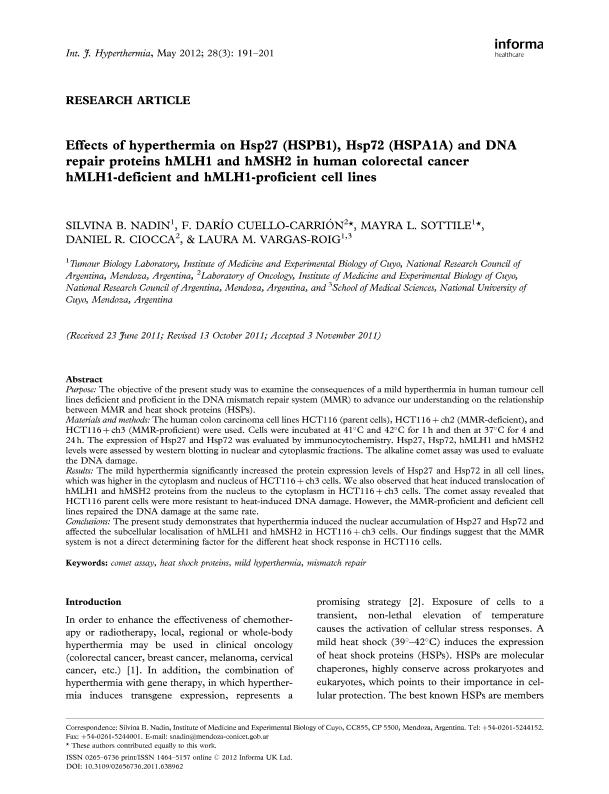Artículo
Effects of hyperthermia on Hsp27 (HSPB1), Hsp72 (HSPA1A) and DNA repair proteins hMLH1 and hMSH2 in human colorectal cancer hMLH1-deficient and hMLH1-proficient cell lines
Nadin, Silvina Beatriz ; Cuello Carrión, Fernando Darío
; Cuello Carrión, Fernando Darío ; Sottile Fleury, Mayra Lis
; Sottile Fleury, Mayra Lis ; Ciocca, Daniel Ramon
; Ciocca, Daniel Ramon ; Vargas Roig, Laura Maria
; Vargas Roig, Laura Maria
 ; Cuello Carrión, Fernando Darío
; Cuello Carrión, Fernando Darío ; Sottile Fleury, Mayra Lis
; Sottile Fleury, Mayra Lis ; Ciocca, Daniel Ramon
; Ciocca, Daniel Ramon ; Vargas Roig, Laura Maria
; Vargas Roig, Laura Maria
Fecha de publicación:
05/2012
Editorial:
Informa Healthcare
Revista:
International Journal Of Hyperthermia
ISSN:
0265-6736
Idioma:
Inglés
Tipo de recurso:
Artículo publicado
Clasificación temática:
Resumen
Purpose: The objective of the present study was to examine the consequences of a mild hyperthermia in human tumour cell lines deficient and proficient in the DNA mismatch repair system (MMR) to advance our understanding on the relationship between MMR and heat shock proteins (HSPs). Materials and methods: The human colon carcinoma cell lines HCT116 (parent cells), HCT116+ch2 (MMR-deficient), and HCT116+ch3 (MMR-proficient) were used. Cells were incubated at 41°C and 42°C for 1h and then at 37°C for 4 and 24h. The expression of Hsp27 and Hsp72 was evaluated by immunocytochemistry. Hsp27, Hsp72, hMLH1 and hMSH2 levels were assessed by western blotting in nuclear and cytoplasmic fractions. The alkaline comet assay was used to evaluate the DNA damage. Results: The mild hyperthermia significantly increased the protein expression levels of Hsp27 and Hsp72 in all cell lines, which was higher in the cytoplasm and nucleus of HCT116+ch3 cells. We also observed that heat induced translocation of hMLH1 and hMSH2 proteins from the nucleus to the cytoplasm in HCT116+ch3 cells. The comet assay revealed that HCT116 parent cells were more resistant to heat-induced DNA damage. However, the MMR-proficient and deficient cell lines repaired the DNA damage at the same rate. Conclusions: The present study demonstrates that hyperthermia induced the nuclear accumulation of Hsp27 and Hsp72 and affected the subcellular localisation of hMLH1 and hMSH2 in HCT116+ch3 cells. Our findings suggest that the MMR system is not a direct determining factor for the different heat shock response in HCT116 cells.
Palabras clave:
Comet Assay
,
Heat Shock Proteins
,
Mild Hyperthermia
,
Mismatch Repair
Archivos asociados
Licencia
Identificadores
Colecciones
Articulos(IMBECU)
Articulos de INST. DE MEDICINA Y BIO. EXP. DE CUYO
Articulos de INST. DE MEDICINA Y BIO. EXP. DE CUYO
Citación
Nadin, Silvina Beatriz; Cuello Carrión, Fernando Darío; Sottile Fleury, Mayra Lis; Ciocca, Daniel Ramon; Vargas Roig, Laura Maria; Effects of hyperthermia on Hsp27 (HSPB1), Hsp72 (HSPA1A) and DNA repair proteins hMLH1 and hMSH2 in human colorectal cancer hMLH1-deficient and hMLH1-proficient cell lines; Informa Healthcare; International Journal Of Hyperthermia; 28; 3; 5-2012; 191-201
Compartir
Altmétricas



